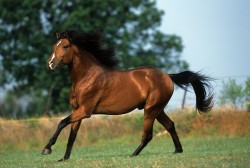 Although for most of us horse care during the summer months is far more pleasurable than during the wet, cold winter period, there are still a number of equine welfare issues that can make this time of year challenging to manage. It is therefore important that horse owners know how to adapt their routine of horse care to suit the warmer climate in order to keep horses happy and healthy.
Although for most of us horse care during the summer months is far more pleasurable than during the wet, cold winter period, there are still a number of equine welfare issues that can make this time of year challenging to manage. It is therefore important that horse owners know how to adapt their routine of horse care to suit the warmer climate in order to keep horses happy and healthy.
Our tips on making summer run more smoothly…
- Water is essential to ensure the horse’s body functions healthily. When horses sweat during hot temperatures they need to replace these fluids to avoid dehydration. A fresh supply of clean water should be readily available, whilst also remembering to take buckets and a supply of water on days out.
- Extra care should be taken when working horses in hot weather. Avoid riding during the hottest hours of the day to minimise the risk of dehydration and take extra time cooling down after a session. It is not just water lost in sweat, but salts and minerals known as electrolytes, which must be replaced. Prolonged reduction in the levels of these electrolytes can affect the function of the muscles, leading to cramping and stiffness. Horslyx contains a high specification vitamins and mineral package which is ideal for helping balance nutrients after hard work.
- Periods of turn out on hard ground can cause hooves to become brittle and prone to cracking. A healthy diet plus regular farrier visits should help protect the hooves against changes in the environment, whilst soaking hooves in water and applying moisturising ointments are great ways of adding moisture. Extra supplements may also be added to the horse’s diet, tailored to hoof health. Every single Horslyx product contains biotin, zinc and methioninewhich helps promote healthy, strong hooves.
- Most horses are naturally well equipped to deal with the elements, but a horse turned out should have access to a shelter or some shade, so that they may choose whether they wish to stand directly in the sun or not. Any pink skin should ideally be protected with a mask or high-factor sun cream, as it lacks the pigmentation to protect itself from UV rays and will burn easily.
- Flies and insects can become a real problem. Use a fly mask to cover the eyes and if possible also the ears to avoid irritation. This can greatly improve the quality of life for an equine during the summer months. Garlic Horslyx can be used to help deter insects. The high level of sulphur compounds found in garlic are released through the skin producing an invisible barrier that flies find repellent. Research proves that Garlic Horslyx can reduce the risk of irritation from flies.
- Garlic Horslyx can also be offered to horses prone to sweet itch. The condition is an allergy to the bites of certain midges and stimulates an over-reaction in the horse’s body, resulting in a variety of symptoms, the most obvious being intense itching and obsessive scratching. Severe sufferers can often scratch until drawing blood, leading to secondary problems with flies and infection. Check daily for any signs of itching, particularly around the base of the tail and the mane, soothing troubled spots before they worsen. Fly rugs are a great tool for creating a barrier between the horse’s skin and insects.
- Some horses can suffer with acute respiratory disorders during the summer, often caused by inhalation of dust and pollen spores. Allergies can cause the tissue and mucus in a horse’s airways to thicken and narrow, meaning that less oxygen is inhaled with each breath. Symptoms may therefore include; heavy breathing, wheezing, a cough or runny nose and a lack of energy. Disorders and allergies can be very distressing and debilitating for the horse. Respiratory Horslyx contains menthol, aniseed and eucalyptus and can be used to support the respiratory system and to help clear airways.
